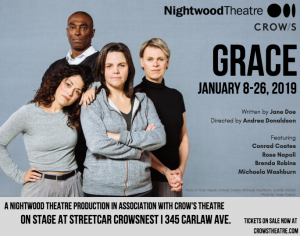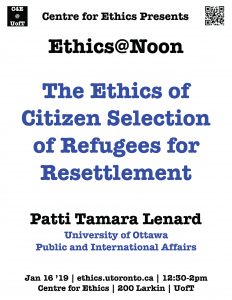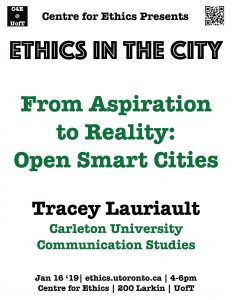- Tue, Jan 8, 2019
"Grace" by Jane Doe (Nightwood Theatre)
Grace by Jane Doe – January 8-26, 2019 at Streetcar Crowsnest. A Nightwood Theatre production in association with Crow’s Theatre. Directed by Andrea Donaldson, starring Michaela Washburn, Rose Napoli, Brenda Robins and Conrad Coates.
Exquisitely told in a stunning blend of documentary theatre, striking visual projections and choreography, Grace is a searing piece that ignites a pertinent discussion on the failures and limitations of the legal system. “There was no justice, there was just a legal outcome.” In the wake of a young woman’s disclosure of childhood sexual assault, a family presses charges. A true story about survival, hope, and the pursuit of justice at a time when provability still usurps truth in our courtrooms.
☛ tickets $25-$40 at crowstheatre.com.
co-sponsored by, among others:
04:00 PM - 06:00 PM
Streetcar Crowsnest
345 Carlaw Avenue - Wed, Jan 16, 2019
Ethics at Noon
Ethics@Noon: Patti Tamara Lenard
The Ethics of Citizen Selection of Refugees for Resettlement
One way that states discharge their duties to refugees is by admitting them for resettlement. Of the millions of refugees in places of refuge, only one million are specially designated by the UNHCR for resettlement in third countries. These individuals, identified by the UNCHR as either especially vulnerable, or particularly unlikely to find any alternative permanent solution, are prioritized for admission to third countries for resettlement. Of these, only a small number are actually selected by host countries for resettlement, however; last year, just over 100 000 found permanent homes in third countries. In this talk, I consider the ethics of one particular way of selecting refugees for resettlement, that is, by giving citizens the driver’s seat in selecting refugees for admission to resettlement. I ask whether it is morally acceptable to permit citizens to name specific refugees for resettlement, under the condition that they are willing to support – financially and emotionally – those whom they name. I argue, ultimately, that there are moral goods that derive from permitting citizens to select refugees for admission, but that they do not outweigh the importance of offering scarce resettlement spots to those who are most in need. Therefore, any refugee admission scheme that permits citizens to select refugees must constrain those who can be named for admission to those who are most in need. I conclude with some proposals for how this can be achieved.
☛ please register here
Patti Tamara Lenard
12:30 PM - 02:00 PM
University of Ottawa
Graduate School of Public and International Affairs
Centre for Ethics, University of Toronto
200 Larkin - Wed, Jan 16, 2019
Ethics of AI in Context, Ethics in the City
Ethics in the City: Tracey Lauriault04:00 PM - 06:00 PM
From Aspiration to Reality: Open Smart Cities
Open smart cities might become a reality for Canada. Globally there are a number of initiatives, programs, and practices that are open smart city like which means that it is possible to have an open, responsive and engaged city that is both socio-technologically enabled, but also one where there is receptivity to and a willingness to grow a critically informed type of technological citizenship (Feenberg). For an open smart city to exist, public officials, the private sector, scholars, civil society and residents and citizens require a definition and a guide to start the exercise of imagining what an open smart city might look like. There is much critical scholarship about the smart city and there are many counter smart city narratives, but there are few depictions of what engagement, participatory design and technological leadership might be. The few examples that do exist are project based and few are systemic. An open smart city definition and guide was therefore created by a group of stakeholders in such a way that it can be used as the basis for the design of an open smart city from the ground up, or to help actors shape or steer the course of emerging or ongoing data and networked urbanist forms (Kitchin) of smart cities to lead them towards being open, engaged and receptive to technological citizenship.
This talk will discuss some of the successes resulting from this Open Smart Cities work, which might also be called a form or engaged scholarship. For example the language for the call for tender of the Infrastructure Canada Smart City Challenge was modified to include as a requisite that engagement and openness be part of the submissions from communities. Also, those involved with the guide have been writing policy articles that critique either AI or the smart city while also offering examples of what is possible. These articles are being read by proponents of Sidewalk Labs in Toronto. Also, the global Open Data Conference held in Argentina in September of 2018 hosted a full workshop on Open Smart Cities and finally Open North is working toward developing key performance indicators to assess those shortlisted by Infrastructure Canada and to help those communities develop an Open Smart Cities submission. The objective of the talk is to demonstrate that it is actually possible to shift public policy on large infrastructure projects, at least, in the short term.
☛ please register here
Tracey Lauriault
Carleton University
Communication Studies
Centre for Ethics, University of Toronto
Rm 200, Larkin Building
Centre for Ethics, University of Toronto
Where conversations about ethics happen.
